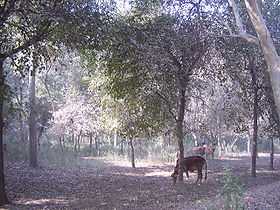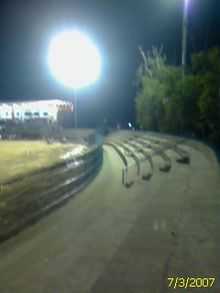Chichawatni
| Chichawatni | |
|---|---|
 Chichawatni | |
| Coordinates: 30°19′N 72°25′E / 30.32°N 72.42°E | |
| Country | Pakistan |
| Province/state | Punjab |
| Population (1998) | |
| • Total | 72,261 |
| • Estimate (2007) | 120,400 |
| Time zone | PST (UTC+5) |
| Calling code | 040 |
| Number of towns | 1 |
| Number of union councils | 3 |
Chichawatni (Urdu: چِيچہ وطنى) is a city in the Sahiwal District of the Pakistani province of Punjab.[1] Situated near the Grand Trunk Road, it lies approximately 45 kilometres (28 mi) from the district capital, Sahiwal.[2] In 2007, Chichawatni's population was estimated at approximately 120,000.
Etymology
There are two leading folk etymologies proposed for the name Chichawatni. The first asserts that the 7th century Raja Dahir named the town Chichawatni – meaning "City of Chach" – for his father, Maharaja Chach of Alor. According to the second etymology, the name is derived from a Hindu family who lived in the area in antiquity, with the father of the family being named Chicha and the mother Watni.
History
During the British Raj, Chichawatni was reputedly transformed from a small Punjabi village into a relatively modern city by infrastructure investment and planning decrees, starting in 1918.[citation needed] At the time of the India-Pakistan Partition of 1947, many aristocratic Indian Muslim families migrated from Punjabi towns like Ludhiana, Jallandhar, Amritsar and Firozpur, and settled in towns like Chichawatni, shaping the city's present-day Muslim elite. Another legacy of the Partition is a large Christian community, with Christianity being most prominent among poorer residents. There were many trees at that place and that place was famous as a place for ghosts and things like that. That time almost all the shops were owned by Hindus but the famous Muslim merchants were Shaikh Zahoor Ahmed Shaikh Sadiq Rana muhammad Alam and Gulam Rasool. When Nehru Lal came to Chichawatni in 40s the eyes of Hindus started changing. There was no peace at that time until the partition of India happened. At that time the Muslim Leaders of the city Nabi Baksh Cheema, Dr. Sardar Khan, Rana muhammad Alam .Shaikh Zahoor and Riaz Ahmed worked hard to help the refugees who were coming from India. After that Chichawatni completely became a Muslaim city and development started. Now there is a Big Ghee mill in the city but mostly businesses are related to farming. The city has changed a lot; the new colonies of the cities are Housing Colony, Bahar Colony, and Faisal colony. Now all the blocks of city are built up and the Bazars are expened in miles. Now there are many cotton and oil mills in Chichawatni.
Overview
Chichawatni presently serves as the main city of Sahiwal Division, and is administratively subdivided into three City Union Councils and 34 rural Union Councils.[1] It is also the headquarters of Chichawatni Tehsil. It lies approximately 20 kilometres (12 mi) from the ancient Upper Indus site of Harappa, and is consequently a popular stop-over for tourists. It furthermore serves as the educational hub for many local villages, offering several colleges and institutions for higher education. Punjabi is the most-spoken language in Sahiwal, including Chichawatni,[3] although Urdu is also commonly spoken.
Forest division

Chichawatni is the headquarters of a Pakistani forest division, also named Chichawatni.During The War Of 1857 Local People Fought Against The British In This Forest.In Second World War Many Foreign Prisoners Were Brought Here. Dating to 1923, the Chichawatni Plantation covers a total forested area of approximately 9,000 acres (36 km²), constituting the second-largest forest plantation in Pakistan,[citation needed] the largest being Changa Manga. The Peregrine Fund, a U.S.-based avian conservation organisation, conducted research in Chichawatni's forests in the early 2000s (decade).[4]
Cattle market
Chichawatni's cattle market, known as Mandi Muwaishiyan, is among the largest in Pakistan.[citation needed] Typically, the market runs from the 21st of each month to the end of the month, with its business peaking in three first days.
Kabbadi stadium

Kabbadi – a team sport similar to wrestling – is popular in Chichawatni, which is home to one of the few floodlit Kabbadi stadiums in Pakistan. The town has played host to numerous Kabbadi championships.[citation needed]
Educational institutions
Chichawatni is home to numerous institutions of secondary and tertiary education, including:
- Govt high school
- Punjab Science School and College
- Government College of Commerce
- Darul Uloom Khatm-e-Nubuwwat (an Islamic institution)
- Dawn Cadet High School
- The Educators College
- Unique Public Higher Secondary School
- Al-Falah Public Higher Secondary School
- Punjab Group of Colleges (Chichawatni Campus)[5]
- Government Crescent College (for girls)[6]
- Government Crescent Girls High School[7]
- Government Degree College
- Government High School (for boys)
- Government M.C. High School (for boys)[8]
Al Mustafa Cadet Meddle School Shamus Pura
- The Laurels Campus
- Sir Syed Schools
Rail links
In 1918, Chichawatni's first railway station was constructed, but its position – in the largely impassable forest to the north of the town – made it difficult to reach, despite the expansion of the station in 1927. In July 2007, a new and more accessible railway station was constructed in Chichawatni, with the sanction of then-Prime Minister Zafarullah Jamali.[citation needed]
Government investment
In recent years, the Government of Punjab has invested significantly into education in Chichawatni, leading to a rapid increase in the local literacy rate. In partnership with private interests, local authorities have also invested into ICT education, improving the computer skills of school and college students in Chichawatni.[9] Numerous municipal parks and museums have also been constructed with government aid.[citation needed]
Notable people from Chichawatni
- Abdul Latif Khalid Cheema, religious leader and head of Chichawatni's Darul Uloom Khatm-e-Nubuwwat[10]
- Mehdi Hassan, ghazal singer
- Esther John, notable Christian martyr
- Rana Mohammad Hanif Khan, former Finance Minister of Pakistan[11]
- Rai Hassan Nawaz, two-time nazim of the District of Sahiwal
- Azam Tariq, co-founder of the political organisation Sipah-e-Sahaba Pakistan
See also
References
- ↑ 1.0 1.1 Tehsils & Unions in the District of Sahiwal – Government of Pakistan. Nrb.gov.pk. Retrieved on 2012-03-04.
- ↑ Location of Chichawatni. Falling Rain. Retrieved 2012-02-11.
- ↑ Sahiwal. FindPK.com. Retrieved 31 December 2012.
- ↑ Asian Vulture Crisis Archives - Summary of Field Study Results from Pakistan for the Breeding Season 2000/2001. Peregrine Fund, 2 December 2001. Retrieved 9 April 2012.
- ↑ New Campuses – Punjab Group. Pgc.edu. Retrieved on 2012-03-04.
- ↑ Govt. Crescent College. Chichawatni.com. Retrieved on 2012-03-04.
- ↑ Schooling Log Pakistan :: Government Girls High School CRESCENT CHICHAWATNI, CHICHAWATANI, SAHIWAL, Punjab. Schoolinglog.com (2011-02-02). Retrieved on 2012-03-04.
- ↑ TMA Chichawatni Website. Tmachichawatni.com. Retrieved on 2012-03-04.
- ↑ The Computer Scientists. Mspartnerpk.com. Retrieved 2012-03-04.
- ↑ "الطاف حسین صہیونی ایجنڈے پر کام کررہے ہیں‘ عبداللطیف خالد". Jasarat. 13 September 2011. Retrieved 17 September 2011.
- ↑ Govt. Post Graduate College Sahiwal. 2009. Retrieved 2012-04-04.
External links
Coordinates: 30°32′N 72°42′E / 30.533°N 72.700°E
| ||||||||||||||||||||||||
